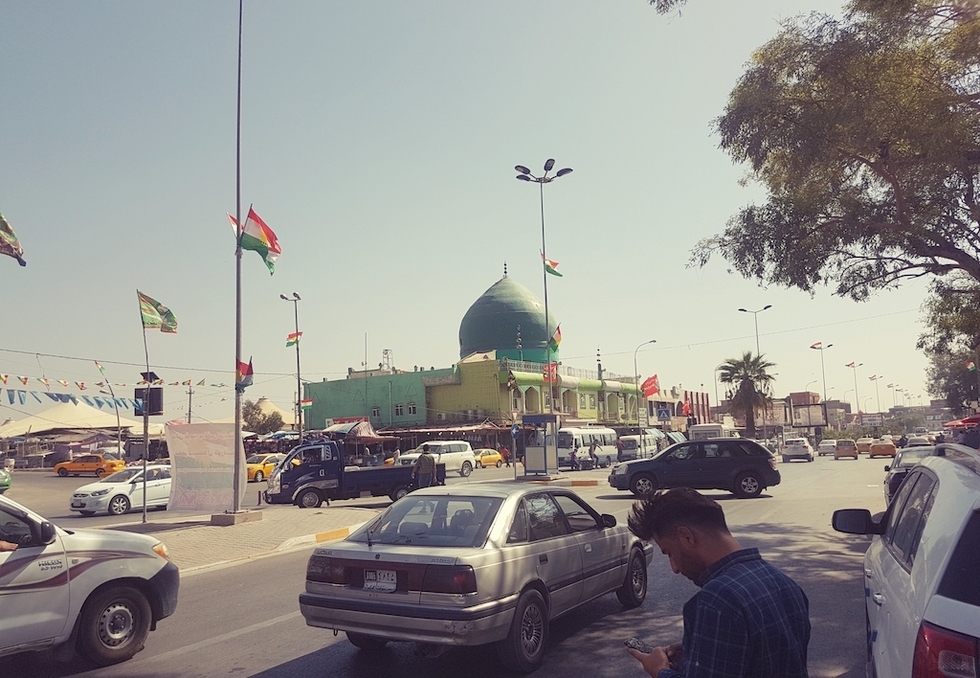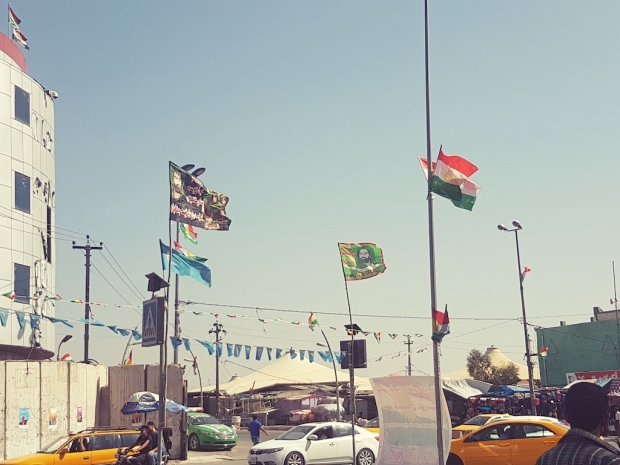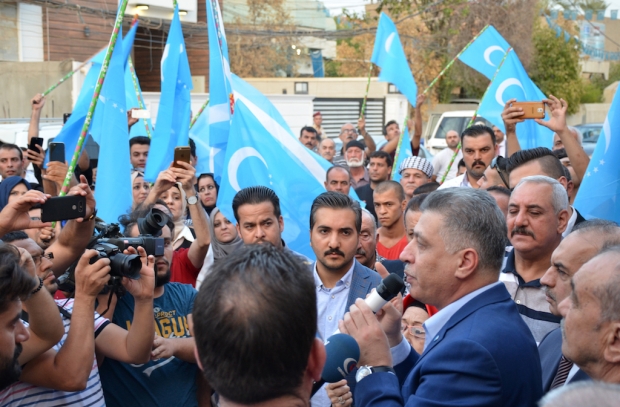Kirkuk centre of attention as Kurds go to polls to vote on independence

KIRKUK, Iraq - As Kurds head to the polls on Monday to vote in the Kurdistan independence referendum, much of the focus is on Kirkuk, the multi-ethnic city that has been included within the referendum’s remit, despite local opposition from some politicians and locals.
Residents of the city were reportedly stocking up on supplies over the weekend as they feared the Kurdish Peshmerga, Shia Hashd al-Shaabi and other armed groups may be poised to clash over the outcome.
Late on Sunday, Iraqi Prime Minister Haider al-Abadi warned that he would go to any length to prevent the breakup of Iraq.
'There is no difference if [Kirkuk] is a part of Kurdistan or a part of Iraq. I don’t care'
- Said Ali, Kirkuk resident
"We will take the necessary measures to preserve the unity of the country," he said, without elaborating, adding that "we will not permit anyone to play with Iraq and not pay the consequences."
For his part, Kurdistan Regional Government (KRG) President Massoud Barzani said that he had “given instructions and orders to all the Peshmerga units not to respond to any provocations by anyone,” but warned that the Peshmerga would nevertheless be ready to respond to violence or attempts to disrupt the voting.
With its mixture of Kurdish, Turkmen and Arab residents - each with more than one armed group - international observers have focused on the city as the apex of any potential fallout from Abadi and Barzani’s posturing.
A market in central Kirkuk is surrounded by an array of flags - some depicting the yellow, red and green with a central sun of Kurdistan flag, some the white crescent moon on azure blue of the Turkmen flag, some depicting Hussein, grandson of the Prophet Mohammed, revered by Shia Muslims.
A number of vendors and buyers in the market expressed their concern over what would happen to the city after Monday, adding they did not want to see political differences damage the fabric of their city.
Kurds have long claimed Kirkuk as their cultural capital, something also claimed by the Turkmen. Kurdish leaders claim that during the rule of Saddam Hussein, the former Baathist strongman strategically replaced the city’s Kurdish population with Arabs in order to change the demographic of the city.
“Why should I be scared, why should I be afraid?” asked one Arab resident, rhetorically.
“There is nothing for me to be scared about. This is my city and I will stay here. I am not afraid."
Said Ali, a 50-year old Arab whose family residency in the city reaches back at least two generations, also said that he was not worried about violence breaking out after the vote.
“No, I’m not worried about that,” he said.
“There is no difference if [Kirkuk] is a part of Kurdistan or a part of Iraq. I don’t care.”
'A high price'
But in spite of the apparent indifference of some residents, armed groups in and around the city have become increasingly agitated - Kirkuk has been controlled by Kurdish Peshmerga since 2014, when the Kurdish fighters drove away the Islamic State group.
Kirkuk is not, however, part of the Kurdistan region that was constitutionally declared after the 2003 invasion that toppled Saddam Hussein - instead, article 140 of the constitution provides for the sovereignty of the city, as well as other disputed areas including Sinjar, to be decided at a later date, by the Iraqi government.
'It has opened the door to hell. It’s opened the door to fighting'
- Hicran Kazanci, Iraqi Turkmen Front
The Hashd al-Shaabi, Shia-dominated militias, many with links to Iran, have put out stark warnings to the Kurdish forces against attempting to fully annex Kirkuk into the Kurdistan region.
"There will be a high price to pay by those who organised this referendum, a provocation aimed at destroying relations between Arabs and Kurds," said Hashed al-Shaabi leader Faleh al-Fayad on Sunday, according to AFP.
"As soon as the referendum takes place there will be a legal and constitutional reaction."
Similarly, armed Kurdish groups including the Iranian-Kurdish Kurdistan Freedom Party (PAK) have also issued warnings to "sacrifice everything until the last blood" to keep Kirkuk under Kurdish control.
Turkmen have also issued opinions about the referendum - while some are politically aligned with the KRG and have expressed a desire to join the new state; others have been deeply suspicious of the referendum and have called for Kirkuk to remain part of Iraq.
Hicran Kazanci, head of the foreign relations department of the Iraqi Turkman Front, told Middle East Eye that the referendum was an attempt by President Barzani to maintain his grip on power.
"Why this time they are talking about a referendum? Because Mr Barzani, his position is done," he said.
"The Kurdish parliament should choose another one or make an election for the president of the region. That’s first."
The Iraqi Turkmen Front were one of the main groups to protest against a decision by the Kirkuk provincial council to hoist the Kurdistan flag over municipal buildings in March.
They have repeatedly argued that any attempt to include Kirkuk as part of the KRG is unconstitutional.
'We want Iraq to be united and we want to live in peace'
- Customer in market
"We say no, we don’t go to referendum - many people, not only Turkmen, not only Arab, Kurdish people say it is a bad thing," said Kazanci.
"Because it has opened the door to hell. It’s opened the door to fighting."
He added that he believed a majority of Kirkuk's residents opposed the referendum, including Kurds.
"Kurdish people in Kirkuk, I can tell you - 50 percent and more in Kirkuk, they don’t want referendum."
Tensions have run high in the run-up to the referendum on Monday and harsh words have been exchanged by political leaders on all sides.
Amid it all, Kirkuk residents have attempted to maintain a semblance of normality as they wait on tenterhooks for the announcement of the referendum results on Monday evening.
"We want Iraq to be united and we want to live in peace. We don’t want war," said one of the customers in the central market.
"We want Iraq to become back as it was."
This article is available in French on Middle East Eye French edition.
New MEE newsletter: Jerusalem Dispatch
Sign up to get the latest insights and analysis on Israel-Palestine, alongside Turkey Unpacked and other MEE newsletters
Middle East Eye delivers independent and unrivalled coverage and analysis of the Middle East, North Africa and beyond. To learn more about republishing this content and the associated fees, please fill out this form. More about MEE can be found here.



